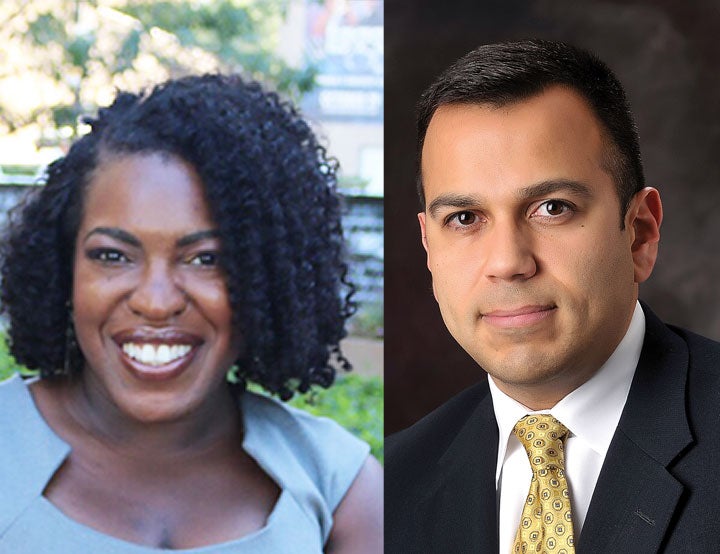Newcomer challenging Alvarado for seat
Published 1:08 pm Monday, October 22, 2018
Voters in the 28th senate district, which includes Clark, Montgomery and part of Fayette counties, will decide between a re-electing Sen. Ralph Alvarado to his second term in office or newcomer Denise Gray.
The Sun met with Alvarado and Gray for extended interviews. Both were asked the same questions, and their answers are included below. In the interest of space, their full responses could not be printed, but the quotes represent their stance to the questions.
Alvarado (R-Winchester) is nearing the end of his first term as the state senator for the 28th district. He ousted former senator R.J. Palmer of Winchester in 2014. Alvarado is a physician, practicing in Winchester since 1998. He is a member of the executive committee of the National Conference of State Legislatures. He and his wife, Dawn, have two children and attend Grace Baptist Church in Winchester.
Gray (D-Lexington) is an educator for Fayette County Public Schools working with special needs children. She was born and raised on the north side of Lexington and earned degrees from the University of Louisville and the University of Denver Sturm College of Law. She is active at her church, Consolidated Baptist Church, and an active member of the Fayette County Democratic Party’s Executive Committee as the 76th Legislative District Chairperson.
WS: What do you think the state senate’s role is in improving Kentucky’s economy and how would you propose generating new revenue for the state?
RA: The legislature’s responsibility is to set a budget every year so there are opportunities within the budget to provide funding for infrastructure and development in communities, whether that be transportation or setting the groundwork for workforce development to make sure you have a workforce that is able to fill the needs of jobs in the community.
I think also from a tax structure, it is important to try to enhance economic development. This past year, we’ve made changes in our tax structure that move Kentucky from 33rd overall to 17th overall for tax competitiveness. From business competitiveness, we’ve also moved from 33rd to 18th overall.
When I first ran for office, I pledged to work on job creation and I think some of the bills we passed, particularly in the 2017 session, lay the foundation for the economy to grow. Since that legislation has passed, over $14 billion has been invested in the state, over 17,000 new jobs were created, and we have the lowest unemployment rate in two generations in Kentucky. We’re in the top three in places where companies want to invest for manufacturing jobs. People are beginning to look at Kentucky like never before and we are preparing the soil to attract new investors and hopefully fuel prosperity and job growth.
DG: Right now, our job growth is stagnant. In Fayette County, we have had over 600 people laid off at Trane. In Montgomery County this past month, we had several folk who were laid off from their positions there at a factory. I believe what stemmed this is things like Right To Work legislation and the prevailing wage. The rhetoric when those laws were passed was that it would bring more jobs to the state. What it has shown is it means a right to work for less. It also means, overall, jobs are leaving our state.
We need to think of some out-of-the-box ways to bring well-paying jobs to our area. This area is ample ground for growth. Economically, we’re in a great spot with the interstate right here, so we just need to make this place an environment that is welcoming to companies to come and for employees to come as well. To attract employees, is to pay a living wage.
WS: The legislature passed SB 151 in the last session to address the state’s underfunded pension issues. That bill has received some praise and loud criticism. What are some of the positive aspects of that bill and some of the negative implications? How would you improve on it?
RA: I think the positive is what the bill actually does. Effectively, it saves the pension system going forward. When I ran for office, we all recognized that the pension situation was in dire straits. The state’s credit rating was also at risk and several credit agencies warned the state that if something did not change, it would change our bonds to junk status and it really would negatively affect the economy of Kentucky. We knew we had to act and an analysis was done over the last summer that recognized that inaction was not an option for us with the pensions.
What SB 151 did is it provides for new hires the same retirement system other state employees have but we were able to keep the promises to existing teachers and retirees. Retirees would have no change in their retirement at all. Current teachers would have the same benefits. The only change would be any sick days accumulated after the first of the year could not be used to enhance their retirement — that was the only difference, which is outside the inviolable contract for existing teachers. Teachers with less than five years can opt for the new plan or the plan they are already under. New teachers coming in would have a different system but it offers them portability in their retirement, and if the same rate of return was applied as the existing teachers have had, those new teachers would have, at the end of 30 years, $720,000 that they could will to their family, invest however they wanted and would have an annuitized benefit of $62,000 a year in retirement.
The negative is the public relations surrounding the passage of the bill. People were unhappy with the process. Process is not something I get to vote on, unfortunately. I liken it to the wrapping paper on a gift. It may not look pretty how that gets done, and we often talk about laws being made and passed like it’s sausage making. No one wants to watch the process being done but in the end, if the product is good is what matters.
DG: Senate Bill 151, or what we called the sewage bill, I am an educator, so that whole pension crisis or the news that we heard was directly affecting myself and my coworkers and so many people in our community.
To find some positives, a bill was passed. There’s a positive.
The negatives, however, far outweigh the positive.
We, the people, deserve transparency. The way the bill was passed without the public having a say so, without the readings necessary, without our legislators actually reading the bill, all are negatives to me.
That is not how the people deserve their government to work and that is not how your government was made to work.
To shove the people out in order to, I guess, get a win is not good for the Commonwealth or the people of the 28th senate district.
WS: How do you think your career background makes you the best candidate for this office?
RA: I’m the only of my kind in many aspects. I’m the only physician in the general assembly, and in health care I’ve had a lot of different roles. I’ve been able to work in the clinic setting, so I know what the patient needs are and their frustrations. I’ve worked as a medical director of insurance companies. I’ve worked as medical staff at hospitals. In just the last year, I was hired as a nursing home director. Health care is a very complicated system. I liken it to a spider web — you can touch one side and the rest of it vibrates and people get nervous when there are changes to the health care system.
I have an understanding of where the pressure points are and the needs of different organizations to get true reform that will benefit the patients and the providers.
It has also given me an opportunity to advocate for a lot of public health issues that are nonpartisan and given me the opportunity to work on both sides of the aisle and develop relationships that help get other bills accomplished and allow for collaboration among parties to move bills forward.
DG: I am a graduate of the University of Denver Sturm College of Law. With my background and my training in law, it has taught me how to read a bill, how to write a law. In Colorado, I actually had a hand in writing several bills. All that comes hand in hand with what I would be doing in the senate.
Being an educator, I work with special needs students. Working with students in general, teaches you to work with a group of people who don’t necessarily want to hear you. Part of being an educator is communicating in such a way that the other party is able to receive it.
WS: How would you propose talking the opioid epidemic in our state? Are there policies in place that work or do not work? What would you add?
RA: The heroin bill we passed during my first year was a good bill that stiffened penalties for drug dealers and people that imported drugs into the state. It also provided for better treatment option for people with drug addiction who are looking for escape. It gave the option for reporting overdoses without being prosecuted and gave communities the option to establish needle exchanges.
We’ve also allocated more funds toward drug treatment and I think we need to have more drug treatment options. We’re beginning to see that in the state working with the federal government. We’re also seeing more efforts on the local level.
From a government perspective, fostering more treatment options and ensuring that insurance will pay for those treatment options.
I liken it to a bucket with 50 holes in it. You can plug one, two, 10, 20 holes, but it’s still going to leak.
It’s going to take more than just government to fix the problem.
DG: I think we need to improve Casey’s Law in that I have had close friends who have dealt with the passing of their spouses and dealing with their children who are addicted to opiates. I have one friend in particular who used Casey’s Law to get her child some help. It didn’t. She ended with a $2,500 attorney bill and that’s all she got. Casey’s Law is basically involuntary drug treatment. In order to treat addiction, you have to have buy-in from the person you’re treating.
Also, not the best solution is using our criminal justice system. If you go to our county jail, a lot of those who are there are due to their addiction. What we’ve created is essential a revolving door that has always been there. It just imprisons a whole group of people who needed treatment.
We need to speak to those who are trained and have the expertise to deal with those who are addicted and those who are once addicted to see what worked for them.
WS: What are some of the best and worst laws passed in the 2018 session?
RA: We passed a budget. That is our first requirement as a state. This is the first structurally-balanced budget in over a generation in Kentucky, which means we didn’t use one-time monies to plug holes in the budgets. We guaranteed what we spend is what is coming in.
What we passed stabilized the pension situation in our state and preserved the pension going forward.
The reformation of our tax code — that’s still going to take a lot of work. That’s the first in a multi-year process to gradually change our taxation from a production-based to a consumption-based taxation system.
I think we passed almost 200 bills. I don’t think any are necessarily bad … most of the bills have been pretty good pieces of legislation. Of course, no bill is ever perfect, so once they pass, we’ll take them and make fixes and reforms. I know in our tax codes there are glitches that have been identified that were unintended consequences
Something I’m proud of also is that we were able to fully-fund our pension systems.
I’m also a pro-life guy, and we’ve gotten some very significant bills passed in overwhelming bipartisan support that were bottled up for decades that protect the unborn — ills that look at 20 weeks and beyond to not do abortions, requiring ultrasounds prior to having an abortion, and informed consent.
I’m proud of seeing those things move through.
DG: I disagreed with the gang bill. I disagreed with pension reform. I disagreed with the tax reform because it ended up being that the most wealthy ended up with a tax break while everyone else’s taxes went up. That reform is hitting the middle- and working-class the hardest. We just need some real people in there who are regular, everyday people who are able to make laws that are more equitable.
I, at this moment, cannot think of any really good bills or laws that were passed this last session. there perhaps were, but the bad so far outweighs and is louder than the good, that it’s hard to find the good when there’s so much bad.
WS: What are some of the most important issues the legislature should take up in the next session?
RA: From a healthcare perspective, I have a lot of patient advocacy issues I worked on last year I’m hoping will gain some steam. Things like out of network billing, which people call surprise billing, we’re hoping to take patients out of the middle of that problem. We’re looking at health care transparency so patients can shop for their health care, and know the cost of procedures and we may expand that to pharmaceuticals.
We’re also having to try to find a way to fund our Medicaid deficit which is about $300 million right now. We’ve got to find a way to plug the hole if we want to maintain Medicaid expansion.
I think we’re going to look at some fixes from the recent revenue bill and I think we’re also looking at anything that’s going to further improve the opportunity to create jobs.
We’ll likely be addressing our road funds. There are federal toll credits that we have that we always use to fund our road programs. Those are going away, and we’re going to have to find a way to continue funding our roads in the future.
DG: We need to find revenue for the state. Our areas are drowning and the tax reform that was done this session it didn’t adequately address any of the revenue. We are in the bottom with economic development. We need to reevaluate how to increase revenue. We need to harness what we have and think about everyone in the process.
(We need to revisit hemp) that used to be Kentucky’s cash crop. Why are only a select few able to grow hemp and profit off of it?
A hot issue has been reestablishing civil rights for those with felines who have totally completed their time and their requirement of parole or probation. And that does not include those who are sex offenders because, under a law, their time never ceases, they always have to check in and stay away from schools, etc. They’re not inclusive of that.
Fully-funding public education is always on my list. Revoking Right To Work. Revoking charter schools. We need to look into the privatization of our jails.
WS: A lot of conversation in this election has centered around the “nastiness” in politics and that the legislature is unable to work across party lines. Do you think that perception is true? How do you propose improving the atmosphere of politics in Kentucky?
RA: I’m a prime example of someone who can work with both sides. I think the divide we see in Kentucky, there is a Republican-Democrat divide on certain issues. I don’t think it’s anything like we see on the national stage. I think there’s a collegiality amongst members of the general assembly. We understand that we can disagree and debate. It may get heated, but it’s not nasty.
I think what we saw more of this past session was people showed up to committee hearings that were not members of the general assembly who were a bit more abrasive in their approach and i don’t think there’s a need for that. I think we’re all adults. We’re all there to help solve problems. But in Kentucky, I don’t see the perception of the nastiness in policies with the people I interact with.
DG: It is true. Right now, our general assembly is so divided. But that is the culture of our nation right now and it has trickled down to our state government. Right now, we have a lot of outside interests, lobbyists and special interests groups that have a hand on the laws being passed. I’ve talked with Republicans in the senate who are ready to work with me. I believe this next session, when I’m elected, that whole culture may take a change. The understanding is that we all need to work together and that not one person knows all the answers. If the people aren’t winning, then nobody wins and this past session, the people lost.
WS: What are some of the best and worst things Gov. Matt Bevin has done in his administration?
RA: It’s always difficult to try to critique someone else. I think our governor is an excellent salesman. I think he’s an individual who set a goal to make this state a top manufacturing and engineering state in the Union, and I think he’s done a tremendous job going to other countries and recruiting business development. He’s had successful trips to Germany and France and Korea and Japan to try to bring development.
I wish his rhetoric would have been different on a lot of issues. That is something that is out of our control. All I can control is my own rhetoric, and I always try to be very respectful and very analytical about the things we try to get accomplished.
DG: The best thing has been his stance with adoptions. That’s something I may be doing in the future so anything that can help that process go smoother because we have so many young people who deserve a loving family.
The worst thing: name-calling. As an educator who works with students starting from kindergarten to high school, one of the things you teach is not to name call and treat people with respect. To call our educators and our public servants thugs. To say that because people take a stand and use their First Amendment right to protest children are at home being molested is childish. It shows a lack of leadership.
WS: If elected, what three things would you want to accomplish in a single term?
RA: The opiate situation continues to be a huge issue for the state, so finding a health care approach that can preserve our Medicaid funding and try to be innovative to protect funding for our opiate treatment programs.
I’d like to see us continue along the lines of tax reform and see our state continue to move on that multi-year process of transitioning to a more competitive state and one of the top states when it comes to taxation
Again, it’s to continue workforce development and job creation. That was my pledge when I started, and it continues to be my pledge.
DG: When I am elected, my dream would be to fully-fund public education, to pass a bill that ensures regardless of gender or whatever else equal pay for equal work and to sponsor a bill that brings revenue into the state of Kentucky in the most hard-hit areas like eastern Kentucky, where it’s been stagnant for so long. When the revenue comes, they’ll have clean water, the living facilities, and more that they deserve.






